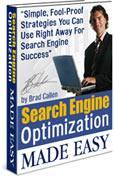|
Press Releases are Free Advertising.You've decided to write a Press Release. Now where to being? Keep reading. And be sure to sign up for the Press Release Tutorial class -- it's FREE.. How to Write a Press Release that Editors will Publish
Most everyone has heard the "Want free publicity, write a press release" spiel. Yet, too many small business owners still neglect this excellent source of exposure for their company and products. "I'll just run an ad. It's easier," they say. Yet, if they really understood the impact of a press release compared to an advertisement, I don't think they'd hesitate to make the most of this marketing strategy. Let me share an exercise that I conducted in a networking meeting a few months back that should help you better understand the difference between a press release and an ad. This will also help you determine for yourself which is a better marketing strategy for your business. Before the meeting, where I was the presenter, I cut several articles and news clippings from our local paper. None of the articles had bylines ("by Author's Name"). The stories were published on various pages of the paper. Each was about a different topic. As I began the presentation, I asked the group of about 20 small business owners to look briefly at each clipping and tell me what was significant about these stories. Various items were mentioned -- the subjects of the articles, the locations, the lengths. Yet no one touched on the one similarity. Almost without a doubt, each of these news stories were generated through a press release. (Now, you may ask how I know that. In another town, I might not have, but I was personally familiar with this particular newspaper and knew their specific policy and format for printing news stories. Because there was no byline, and because the stories were not part of their regular columns, I was relatively sure that each of the stories I had chosen had been generated by a press release and written by a junior staff member.) The purpose in this exercise was to point out that while some people (like me with personal knowledge of this paper and a journalism background) would know these were press releases, the majority of people wouldn't. Most people, even well-educated ones like these business owners, would perceive these stories to be simply news stories written by the newspaper's staff. And that can be VERY significant to your business. Let's consider... If you read an article in the paper, what do you think? Usually, that it's true. At least most of the time. While we've learned that "you can't believe everything you read," to a certain extent, we still tend to believe that if a notable newspaper publishes a story, it's true. Period. On the other hand, how many advertisements that you read do you believe without question? Probably very few. Reading an ad does not necessarily make you believe in that product. You know that someone paid to run that ad. You know the advertiser has an ulterior motive -- profit. You know the purpose of an ad is to sell you something. So you don't believe what an ad says just because you read it... EVEN IF YOU READ IT IN THE SAME NEWSPAPER. That's the significance! We believe a news story because, in our minds, a news story is impartial. Its purpose is to educate and inform, not to earn a profit. A news story is, in effect, the opposite of an ad. And because we believe a news story, we are MUCH more likely to act on it... to purchase the product it recommends, to do business with the company it describes. We TRUST a news story... therefore we TRUST the subject of that story. And that's the whole purpose of advertising -- to build trust in our customers and prospects. Now that you better understand the power of a press release to build trust in your target audience, you'll want to become proficient at writing effective releases that editors will publish. By following these simple tips, you can ensure every release you write accomplishes its purpose of getting you free news coverage that far outweighs any amount of paid advertising you might do.
1. Write a news item, not a sales letter.The number one rule you MUST remember is that a press release is called a news release for a reason -- it's all about NEWS. It's NOT a sales letter, a biography, or even a company report. It's news. Its purpose is to inform, educate, even entertain... not to sell. Leave out the hype, the exaggeration and the flowery phrases that try to sell the reader. While a press release can help you sell (and yes, that's your ultimate purpose for writing it), the idea is to create a newsworthy item that will meet an editor's continual need for timely, publishable material. 2. Explain how your news benefits readers.To interest an editor, you should ultimately aim your release at the reader. It's the editor's job to satisfy the reader, and if you can do that, you're half way there. To do this, consider why someone reads a news story or an article. Typically, though we hate to admit, our number one thought is "What's In It For Me?" (WIIFM). What's in it for me? Why should I read this story? • How will your product solve my problem? Answer these questions for the reader and you've met the editor's needs for information the reader wants and are well on your way to publication. 3. Give 'em the facts.The simplest way to remember to include all necessary information is to answer the journalist's questions of Who? What? Where? When? Why? and How? Embellish each answer as necessary, but don't leave out important details. 4. Spend as much, or more, time on your headline as you do the press release itself.Your headline is your "first impression." Make a good one with a strong, informative statement that grabs an editor's attention and makes her want to read more. 5. Keep it simple.Use simple language. Short words and sentences. And keep it short. NEVER go over two pages. One is better. The idea is to tease an editor with enough information to show that your item is newsworthy and encourage him to call or contact you for the "rest of the story." 6. Target your press release.
While the common mindset is that the more editors who see your release, the more chance that someone will publish it, this isn't necessarily true. Target your press release to editors who are interested in your style of news. If you're writing about gift ideas for Secretary's Day, don't target the Home and Garden editor. If you're sharing information about your new product for grandparents, you're wasting your time submitting to a teen magazine. Consider the audience you want to reach and submit your release appropriately. 7. Ask yourself, "What makes this newsworthy?"If you can't satisfy yourself with the answer, chances are you can't satisfy an editor, either. Yet, don't give up too easily! All too often we think, "I don't have any news to share" when in reality, it's all a matter of how you see things. Look for unusual angles, a different approach. You may surprise yourself by what you find worth writing about. 8. Format your press release properly.There is a typical layout to press releases that editors expect. Following this basic format will alert an editor to the fact that you are a professional and that you care about your submission. Ignoring this format can harm your chances of publication. For a sample of what to include and how it should look, visit http://wahmteam.com/articles/prsample1.shtml. This is an actual release, that I wrote for one of my clients, which was submitted and printed by a number of online and offline publications. 9. Proofread your press release thoroughly!Once you've written what you believe to be your best release, take a break. Walk away from it for an hour or two, or a day or two, if you can. Then return to your release and read it again. Read it aloud. Ask others to read it. Listen for errors, poor sentence structure, awkward phrases. Then rewrite and polish your release until it shines! 10. Distribute your press release.Obviously, this is an important step in the press release process, yet I've known people who went to all the trouble of writing a release and never bothered to distribute it. Be sure you follow-through to submission. Building a distribution list can be time-consuming. You may prefer to use one of a number of services available online to distribute your release. Most of these companies offer a targeted list based on your industry and audience.
Throwing together a few sentences with some sales copy and contact information thrown in for good measure does not create a press release. Yet, all too often, that's the type of release that lands on an editor's desk. If you'll take the time to craft your release properly and offer an editor a newsworthy item that's suitable for his or her audience, however, you'll be amazed at how readily editor's will publish your release and how quickly readers will respond in kind. If, after reading this article, you still don't feel comfortable trying to write your own release, hire a professional! Click here for information on WAHM Team's Writing and Editorial Services.
Darlene Bishop is a professional writer, editor and desktop publisher who specializes in working with WAHMs and home-based business owners. Discover how she can help you grow your business on a shoestring through affordable, professional communications at http://wahmteam.com - the newest online resource for WAHMs.
|

